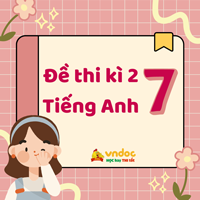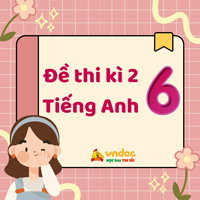Bộ đề thi thử THPT Quốc gia môn Tiếng Anh năm 2016 trường THPT Yên Lạc 2, Vĩnh Phúc (lần 1)
Đề thi thử THPT Quốc gia môn Tiếng Anh năm 2016
Bộ đề thi thử THPT Quốc gia môn Tiếng Anh năm 2016 trường THPT Yên Lạc 2, Vĩnh Phúc (lần 1) gồm 6 đề có đáp án đi kèm, đây là tài liệu ôn tập môn Tiếng Anh hữu ích dành cho các bạn học sinh lớp 12 luyện thi THPT Quốc gia và những bạn luyện thi đại học khối D, A1, mời các bạn tham khảo.
Đề thi thử THPT Quốc gia môn Tiếng Anh lần 1 trường THPT Ngô Sĩ Liên, Bắc Giang năm 2016
Đề thi thử THPT Quốc gia môn Tiếng Anh lần 2 trường THPT Ngô Sĩ Liên, Bắc Giang năm 2016
Đề thi thử môn Anh THPT Quốc gia năm 2016 trực tuyến (Giải thích chi tiết Key)
TRƯỜNG THPT YÊN LẠC 2
ĐỀ THI KHẢO SÁT CHẤT LƯỢNG LẦN 1 NĂM HỌC 2015 - 2016
Môn: Tiếng Anh, Khối: 12
Thời gian làm bài: 90 phút (Không kể thời gian phát đề)
Đề thi gồm: 06 trang
SECTION A: MULTIPLE CHOICE.
Read the following passage and choose the letter A, B, C, or D to indicate the correct answer to each of the questions:
THE OPEN UNIVERSITY
The Open University was created in 1968 to give people who cannot afford (1)_______ attend regular courses of study, the opportunity of studying and (2)_______ a university diploma or degree. They study at home and their academic performance is assessed by (3)_______ of written examinations or project work. Most Open University students (4)_______ in study while also holding down a job or coping with a busy home life. They study in order to update their job skills or for personal (5)_______ .
At the heart of most courses is a (6)_______ of specially written and professionally printed textbooks and workbooks which students receive by post. On many of the courses, students are expected to watch television programmes on the BBC network, (7)_______ are usually broadcast in the (8)_______ hours of the morning. The (9)_______ of these programmes is to develop and broaden the study experience, (10)_______ students do not have to rely only on the printed material they are sent.
Question 1. A. to B. in C. with D. for
Question 2. A. obtain B. to obtain C. obtained D. obtaining
Question 3. A. means B. method C. route D. system
Question 4. A. fit B. take C. put D. join
Question 5. A. satisfying B. satisfaction C. satisfactory D. satisfied
Question 6. A. club B. heap C. set D. unit
Question 7. A. what B. which C. who D. that
Question 8. A. first B. early C. initial D. starting
Question 9. A. end B. aim C. reason D. cause
Question 10. A. although B. however C. even though D. so that
Mark the letter A, B, C, or D on your answer sheet to indicate the word or phrase that is CLOSET in meaning to the underlined part in each of the following questions.
Question 11. I didn't think his comments were very appropriate at the time.
A. right B. correct C. exact D. suitable
Question 12. Professor Smith was very interested in the diversity of cultures all over the world.
A. difference B. changes C. conservation D. variety
Question 13. When you are in a restaurant, you can raise your hand slightly to show that you need assistance.
A. food B. help C. bill D. menu
Choose the word whose main stress is placed differently from that of the others:
Question 14. A. majority B. ceremony C. maintain D. engage
Question 15. A. examination B. sociology C. university D. geographical
Question 16. A. sacrifice B. romantic C. marriage D. conical
Choose the word which has the underlined part pronounced differently from that of the rest:
Question 17. A. cooked B. wicked C. looked D. picked
Question 18. A. rises B. fixes C. likes D. matches
Read the following passage and choose the letter A, B, C, or D to indicate the correct answer to each of the questions:
EDUCATION IN THE FUTURE
Education is another area of social life in which information technology is changing the way we communicate. Today's college students may not simply sit in a lecture or a library to learn about their field. Through their computers and the wonders of virtual reality they can participate in lifelike simulated experiences. Consider the following scenario of the future of education made possible through developments in information technology.
For children over the age of 10, daily attendance at schools is not compulsory. Some of the older children attend school only once or twice weekly to get tutorial support or instruction from a teacher. For the most part, pupils are encouraged to work online from home. Students must complete a minimum number of study hours per year; however, they may make up these hours by studying at home at times that suit their family schedule. They can log on early or late in the day and even join live classes in other countries. In order to ensure that each student is learning adequately, computer software will automatically monitor the number of hours a week each student studies on-line as well as that students' learning materials and assessment activities. Reports will be available for parents and teachers. The software can then identify the best learning activities and condition for each individual student and generate similar activities. It can also identify areas of weak achievement and produce special programs adjusted to the students' needs.
Question 19. How many times are children who are older than 10 required to go to school weekly?
A. notime B. three times C. four times D. once or twice
Question 20. The pronoun "it" in paragraph 1 refers to ___________
A. the software B. learning activities C. condition D. individual student
Question 21. What is NOT MENTIONED as a benefit of information technology to the students?
A. Students' learning time won't be monitored.
B. Students' weak achievement can be identified.
C. Students can learn at times that suit their schedule.
D. Students can stay at home to learn.
Question 22. What CAN'T the software do?
A. Monitor the time the students learn.
B. Find out the best activities for the students.
C. Identify weaknesses of the students.
D. Design materials for the students
Question 23. What is the topic of the passage?
A. The effect of information technology on education.
B. Computer software will make sure students learn at home.
C. Students can know about their weak aspects to focus.
D. students don't have to go to school any more.
Question 24. The word suit in the passage mostly means __________ ?
A. enhance B. show up C. fit D. distub
Question 25. The pronoun "They" in paragraph 1 refers to ________
A. college students B. The computers
C. the wonders of virtual reality D. The lectures
Question 26. Who/What counts the number of hours per week that students spend learning?
A. Parents B. Teacher C. Computer software D. Virtual reality
Question 27. The word adequately in the passage mostly means __________ ?
A. suficiently B. significantly C. consequently D. Suitably
Question 28. The word encouraged in the passage mostly means __________ ?
A. Suggested B. Allowed C. Permitted D. stimulated
Mark the letter A, B, C, or D on your answer sheet to indicate the underlined part that needs correction in each of the following questions.
Question 29. I'll make some sandwiches before I'll leave for work.
A. I'll leave B. for work
C. I'll make D. some sandwiches before
Question 30. The reason why he's not feeling very well is simple - he's ate too much as usual.
A. is simple B. he's not feeling C. he's ate D. as usual
Question 31. Where I am living now is convenient for work because I don't have travel far.
A. for work because I don't B. is convenient
C. have travel far D. Where I am
Question 32. She washes her hair at least six time a week
A. time B. at least six C. washes her hair D. a week
Question 33. Mary found it hard to concentrate on her work because the noise.
A. because the noise B. it hard
C. work D. to concentrate
Read the following passage and choose the letter A, B, C, or D to indicate the correct answer to each of the questions:
Esperanto is what is called a planned, or artificial language. It was created more than a century ago by Polish eye doctor Ludwik Lazar Zamenhof. Zamenhof believed that a common language would help to alleviate some of the misunderstandings among cultures.
In Zamenhofs first attempt at a universal language, he tried to create a language that was as uncomplicated as possible. This first language included words such as ab, ac, ba, eb, be, and ce.
This did not result in a workable language in that these monosyllabic words. though short, were not easy to understand or to retain Next, Zamenhof tried a different way of constructing a simplified language. He made the words in his language sound like words that people already knew, but he simplified the grammar tremendously. One example of how he simplified the language can be seen in the suffixes: all nouns in this language end in 0, as in the noun amiko, which means "friend," and all adjectives end in -a, as in the adjective bela, which means "pretty." Another example of the simplified language can be seen in the prefix mal-, which makes a word opposite in meaning; the word malamiko therefore means "enemy," and the word malbela therefore means "ugly" in Zamenhofs language.
In 1887, Zamenhof wrote a description of this language and published it. He used a pen name, Dr. Esperanto, when signing the book. He selected the name Esperanto because this word means "a person who hopes" in his language. Esperanto clubs began popping up throughout Europe and by1905, Esperanto had spread from Europe to America and Asia.
In 1905, the First World Congress of Esperanto took place in France, with approximately 700 attendees from 20 different countries. Congresses were held annually for nine years, and 4,000 attendees were registered for the Tenth World Esperanto Congress scheduled for 1914, when World War I erupted and forced its cancellation.
Esperanto has had its ups and downs in the period since World War I. Today, years after it was introduced, it is estimated that perhaps a quarter of a million people are fluent in it. This may seem like a large number, but it is really quite small when compared with the billion English speakers and billion Mandarin Chinese speakers in today's world. Current advocates would like to see its use grow considerably and are taking steps to try to make this happen.
Question 34. The expression "popping up" in the fourth paragraph could best be replaced by ____________.
A. shouting B. leaping C. hiding D. opening
Question 35. It can be inferred from the passage that the Third World Congress of Esperanto took place in__________ .
A. 1905 B. 1907 C. 1913 D. 1909
Question 36. This passage would most likely be assigned reading in a course on ________.
A. English grammar B. applied linguistics
C. world government D. European history
Question 37. Which paragraph describes the predecessor to Esperanto?
A. The second paragraph B. The first paragraph
C. The third paragraph D. The last paragraph
Question 38. According to the passage, Zamenhof wanted to create a universal language _________.
A. to provide a more complex language B. to build a name for himself
C. to resolve cultural differences D. to create one world culture
Question 39. According to the passage, what happened to the Tenth World Esperanto Congress?
A. It had 4,000 attendees. B. It was scheduled for 1915.
C. It had attendees from 20 countries D. It never took place.
Question 40. The topic of this passage is ______.
A. using language to communicate internationally
B. how language can be improved
C. a language developed in the last few years
D. one man's efforts to create a universal language
Question 41. It can be inferred from the passage that the Esperanto word malespera means __________.
A. hopelessness B. hopeful
C. hopeless D. hope
Question 42. The expression "ups and downs" in the last paragraph is closed in meaning to____________
A. takeoffs and landings B. highs and lows
C. floors and ceilings D. tops and bottoms
Question 43. The paragraph following the passage most likely discusses __________.
A. another of Zamenhofs accomplishment.
B. the disadvantages of usi:1g an artificial language.
C. how current supporters of Esperanto are encouraging its growth.
D. attempts to reconvene the World Congress of Esperanto in the 1920s
Choose the letter A, B, C, or D to indicate the correct answer to each of the following questions.
Question 44. The advanced students are selected to take part ______ the annual International Olympic Competition.
A. at B. for C. from D. in
Question 45. It was _____ simple a question that everyone answered it correctly.
A. such B. so C. very D. too
Question 46. The man said that he _________ the following day.
A. would return B. returned C. will return D. had returned
Question 47. We always feel ________ and secure in our family.
A. safeguard B. safely C. safe D. safety
Question 48. "He didn't understand it." - "________."
A. So did I B. Neither did I C. Was he? D. I did too
Question 49. _______the manager's suggestions were reasonable, the supervisor agreed with them.
A. Until B. Although C. Even though D. Because
Question 50. She accepted that she had acted _______ and mistakenly, which broke up her marriage.
A. wisely B. romantically C. unwisely D. attractively
Question 51. Mary asked me whether I _________ the football match on TV the day before.
A. watch B. had watched C. have watched D. would watch
Question 52. My mother is the first________ up and the last________ to bed.
A. getting- to go B. to get- going C. to get- to go D. getting- going
Question 53. _________ includes our posture, facial expressions and gestures.
A. Verbal B. Communication C. Body language D. Signal
Question 54. When I _______ to the party, Tom and David _______, and John ________.
A. was coming/ had danced/ singing
B. have come/ are dancing/ is singing
C. have come/ are dancing/ is singing
D. came/ were dancing/ was singing
Question 55. English, Maths and Science are _____ subjects in the national curriculum in England.
A. core B. public C. supportive D. independent
Question 56. Fee-paying schools, often called "independent schools" or "___________ schools"
A. public B. primary C. state D. secondary
Question 57. A: " How much sugar do you want in your coffee?" B: " ____"
A. So much B. Too much C. Not much D. Little bit
Question 58. I must thank the man from ________ I got the present.
A. whom B. that C. who D. which
Question 59. Members of your family have very close relationship with each other, ________?
A. have they B. do they C. haven't they D. don't they
Question 60. _____ in the diet is especially important for vegetarians.
A. They obtain enough protein B. Obtaining enough protein
C. By obtaining enough protein D. Enough protein is obtained
Question 61. The telephone _______ by Alexander Graham Bell.
A. inventing B. being invented
C. was invented D. invented
Question 62. A: Thanks very much for your help. B "_________."
A. that's right B. You're welcome
C. Yes, please D. never mind
Mark the letter A, B, C, or D on your answer sheet to indicate the word or phrase that is OPPOSITE in meaning to the underlined part in each of the following questions.
Question 63. If you are at a loose end this weekend, I will show you round the city.
A. reluctant. B. free C. confident D. busy
Question 64. The government has decided that the publication of the report would be "contrary to the public interest".
A. unpleasant B. despicable C. agreeable D. urbane
SECTION B: WRITING
Part 1: Finish each of the following sentences in such a way that it means the same as the sentence printed before it.
1. I started learning English five years ago.
I have .................................................................................................
2. They said that Paula had quit five jobs before working for us.
Paula...................................................................................................
3. "Don't forget to lock the door before you go out", his mother said .
His mother ..........................................................................................
4. If you don't study hard, you will not be able to pass the final exam.
Unless.................................................................................................
5. " Let's go to the cinema tonight" he said.
He suggested..........................................................................................
Part 2: In about 150 words, write a paragraph about the advantages of learning English well.
- Write your paragraph on your answer sheet.
- The following prompts might be helpful to you.
- Communicating with people from other countries
- Widening knowledge about other cultures
- Getting good job in the future
- .....
Đáp án đề thi thử THPT Quốc gia môn Tiếng Anh
01. A 02. D 03. A 04. D 05. B 06. C 07. B 08. B | 09. B 10. D 11. D 12. D 13. B 14. B 15. A 16. B | 17. B 18. C 19. D 20. A 21. A 22. D 23. A 24. C | 25. A 26. C 27. A 28. D 29. A 30. C 31. C 32. A | 33. A 34. D 35. B 36. B 37. A 38. C 39. D 40. D | 41. C 42. B 43. C 44. D 45. B 46. A 47. C 48. B | 49. D 50. C 51. B 52. C 53. C 54. D 55. A 56. A | 57. C 58. A 59. D 60. B 61. C 62. B 63. D 64. C |
SECTION 2.
1. I have learnt English for five years.
2. Paula was said to have quit five jobs before working for us.
3. His mother reminded him to lock the door before he went out.
4. Unless you study hard, you will not be able to pass the final exam.
5. He suggested going to the cinema that night.











